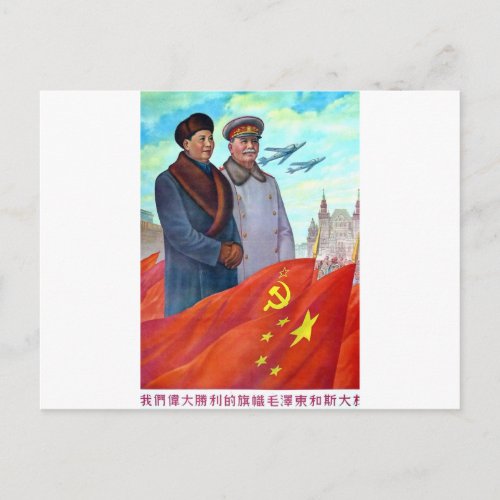Original propaganda Mao tse tung and Joseph Stalin Postcard



In the early 1950s, the People's Republic of China and the Soviet Union were the two largest Communist states in the world. While they had initially been mutually supportive, disagreements arose following the ascendancy of Nikita Khrushchev to power in the Soviet Union after the death of Joseph Stalin. In 1956, Khrushchev denounced Stalin and his policies and subsequently set about implementing post-Stalinist economic reforms. Mao and many members of the Chinese Communist Party were opposed to these changes, believing that they would have negative repercussions for the worldwide Marxist movement, among whom Stalin was still viewed as a hero.[9] Mao believed that Khrushchev was not adhering to Marxism–Leninism, but was instead a revisionist, altering his policies from basic Marxist–Leninist concepts, something Mao feared would allow capitalists to eventually regain control of the country. Relations between the two governments subsequently soured, with the Soviets refusing to support China's case for joining the United Nations and going back on their pledge to supply China with a nuclear weapon.[9] Mao went on to publicly denounce revisionism in April 1960. Without pointing fingers at the Soviet Union, Mao criticized their ideological ally, the League of Communists of Yugoslavia, while the Soviets returned the favour by proxy via criticizing the Party of Labour of Albania, a Chinese ally.[10] In 1963, the Chinese Communist Party began to openly denounce the Soviet Union, publishing a series of nine polemics against its perceived revisionism, with one of them being titled On Khrushchev's Phoney Communism and Historical Lessons for the World, in which Mao charged that Khrushchev was not only a revisionist but also increased the danger of capitalist restoration.[10] Khrushchev's downfall from an internal coup d'état in 1964 also contributed to Mao's fears of his own political vulnerability, particularly because of his declining prestige amongst his colleagues following the Great Leap Forward. by wikipedia.org


